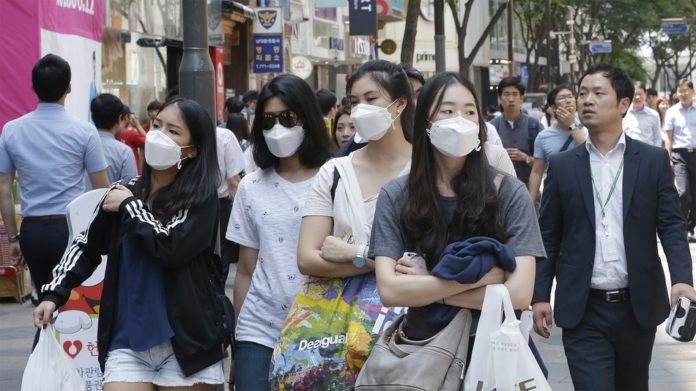MERS fears grow in South Korea after 35 confirmed cases

Cases of MERS, or Middle East Respiratory Syndrome, are growing in South Korea, causing mounting concern in the country over the deadly virus.
In the world’s largest outbreak outside of Saudi Arabia, South Korea has seen 35 cases and two deaths. Since the disease first emerged in Saudi Arabia in 2012, there have been more than 1,100 cases. But while it’s cause for concern, MERS is not sweeping the country in the way some South Koreans think.
Sales of surgical masks are surging, and national airlines have increased their sanitizing standards. Meanwhile, hundreds of schools have closed, and 1,600 people are quarantined.
I just prepared 3 types of masks to protect myself from fearful #MERS disease. Health is important. #Korea pic.twitter.com/hXIxwZbhAi
— Jaehwan Cho 조재환 (@hohocho) June 4, 2015
Some have criticized the media for fueling public panic, as the number of cases grow in South Korea.
According to the World Health Organization human-to-human transmission has been documented in South Korea, but “at this stage, WHO has no evidence of sustained transmission in the community.”
The organization said South Korea’s first case has been traced to a 68-year-old man who recently travelled to the Middle East, and returned to the country on May 4. After developing symptoms of MERS, he visited two out-patient clinics and two hospitals, creating multiple opportunities for exposure among health care workers and other patients, according to WHO.
All the cases so far in South Korea are among health care workers who provided care to the 68-year-old, patients who were given care at the same clinics or hospitals, and family members and visitors.
While MERS is a deadly disease with no vaccine or treatment and a high death rate, there are so far more reasons for calm caution than panic. When he was first being treated, the 68-year-old wasn’t isolated because he wasn’t thought to have been exposed to MERS, which is from the same virus family as the common cold and SARS.
As of Tuesday, WHO did not advise special screening at points of entry into South Korea, nor did it recommend the application of any travel or trade restrictions with the country.
“MERS-CoV is a newly emerging disease that remains poorly understood. Much about the behavior of the virus remains shrouded in scientific uncertainty, though evidence is mounting that dromedary camels can transmit the virus to humans through close contact,” WHO said in a statement.
WHO added that the mortality rate for MERS is 36%.
Symptoms include fever, cough and shortness of breath, with an average incubation period of five to six days. Transmission comes via close contact with people — from living with or caring for someone, for instance — but camels are also thought to spread the virus.
WHO expects more #MERS cases may be reported from Rep of #Korea among ppl in contact w/ initial cases (before precautions were implemented)
— WHO (@WHO) June 3, 2015
Viruses like MERS “remind us all that the globe is indeed a small place when it comes to the rapidity with which infected people can move over large geographic distances, bringing viruses they may be incubating with them,” Christopher Olsen, a virus expert at the University of Wisconsin-Madison, said.
The two people who died from MERS in South Korea are a 58-year-old woman and a 71-year-old man who both had previous respiratory problems, according to the Health Ministry.
Washing hands, covering coughs and sneezes, not touching your face with unclean hands — this all helps prevent MERS, experts say.
Because MERS isn’t airborne and only transmitted through close contact, it’s highly unlikely that anyone will get the disease in crowded areas, such as parks or schools, according to Kang Cheol-In, an infectious diseases expert at the Seoul-based Samsung Medical Center.
Seoul Mayor “More than 1565 people in #Seoul are now vulnerable to #MERS disease now” #Korea pic.twitter.com/yL7jGxq8Mm
— Jaehwan Cho 조재환 (@hohocho) June 4, 2015
But on Thursday, fears were again stoked after Seoul Mayor Park Won-soon held an emergency briefing to inform the public that a doctor who tested positive for MERS came in contact with 1,565 people in the city, local reports said.
“On Saturday, the doctor attended the union meeting for the reconstruction of an apartment complex in Gaepo-dong, Seoul, which was attended by a total of 1,565 local people,” Park said. “He also attended two meetings of medical societies he is affiliated with on Saturday and Sunday, and visited several other public places.”
The doctor contracted the virus after coming into contact with South Korea’s 14th MERS patient at the hospital where he works.
Additional reporting by The Associated Press
Have something to add to this story? Share it in the comments.
